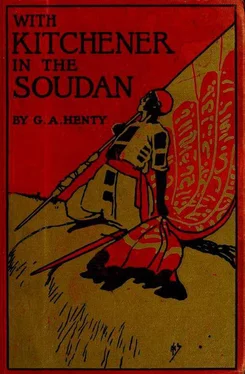Zaki was with him, but as a patient; he had been hit through the leg while charging forward with the Soudanese. At Omdurman Gregory fell into regular work again. So many of the officers of the Egyptian battalions had fallen in battle, or were down with fever, that Colonel Wingate took him as his assistant, and his time was now spent in listening to the stories of tribesmen, who, as soon as the Khalifa's force had passed, had brought in very varying accounts of his strength. Then there were villagers who had complaints to make of robbery, of ill-usage—for this the Arab irregulars, who had been disbanded after the capture of Omdurman, were largely responsible. Besides these there were many petitions by fugitives, who had returned to find their houses occupied and their land seized by others. Gregory was constantly sent off to investigate and decide in these disputes, and was sometimes away for a week at a time. Zaki had recovered rapidly, and as soon as he was able to rise accompanied his master, who obtained valuable assistance from him, as, while Gregory was hearing the stories of witnesses, Zaki went quietly about the villages talking to the old men and women, and frequently obtained evidence that showed that many of the witnesses were perjured, and so enabled his master to give decisions which astonished the people by their justness.
Indeed, the reports of the extraordinary manner in which he seemed able to pick out truth from falsehood, and to decide in favour of the rightful claimant, spread so rapidly from village to village that claimants who came in to Colonel Wingate often requested urgently that the young Bimbashi should be sent out to investigate the matter. " You seem to be attaining the position of a modern Solomon, Hilliard," the Colonel said one day with a smile; "how do you do itl"
Gregory laughed, and told him the manner in which he got at the truth.
" An excellent plan," he said, " and one which it would be well to adopt genei^ally by sending men beforehand to a village. The only objection is, that you could not rely much more upon the reports of your spies than on those of the villagers. The chances are that the claimant who could bid highest would receive their support."
Matters were quiet until the Sirdar returned from England, and determined to make an attempt to capture the Khalifa, whose force was reported not to exceed one thousand men. Two squadrons of Egyptian cavalry and a Soudanese brigade, two Maxims, two mule-guns, and a company of camel corps were placed under the command of Colonel Kitchener. The great difficulty was the lack of water along the route to be traversed. Camels were brought from the Atbara and the Blue Nile, and the whole were collected at Kawa on the White Nile. They started from that point, but the wells were found to be dry, and the force had to retrace its steps and to start afresh from Koli, some forty miles farther up the river.
They endured great hardships, for everything was left behind save the clothes the men and officers stood in, and one hundred rounds of ammunition each, only one pint of water being allowed per head. The country was a desert, covered with interlacing thorn bushes. An eight days' march brought the force to a village which was considered sacred, as it contained the grave of the Khalifa's father and the house where the Khalifa himself had been born. Three days later they reached the abandoned camp of the Khalifa, a wide tract that had been cleared of bush. A great multitude of dwellings constructed of spear-grass stretched away for miles, and at the very lowest compilation it had contained twenty thousand people, of which it was calculated that from eight thousand to ten thousand must have been fighting men, ten times as many as had before been reported to be with the Khalifa.
A reconnaissance showed that a large army was waiting to give battle on a hill which was of great strength, surrounded by deep ravines and pools of water. The position was an anxious one. The total force was about fourteen hundred strong, and a defeat would mean annihilation, while even a victory would scarcely secure the capture of the Khalifa, who with his principal emirs, Osman Digna, El Khatim the Sheik of El Obeid, the Sheik Ed Din, and Fadil, would be able to gallop off if they saw the battle going against them. Colonel Kitchener had the wisdom to decide against risking the destruction of his followers by an assault against so great a force posted in so strong a position. It was a deep mortification to him to have to retreat, and the soldiers were bitterly disappointed, but their commander felt that, brave as the Egyptians and Soudanese had shown themselves, the odds against victory were too great. After a terrible march and great sufferings from thirst and scanty food the force reached Koli on the 5th of February, and were conveyed in steamers down to Omdurman.
After this somewhat unfortunate affair, which naturally added to the prestige of the Khalifa, the months passed uneventfully, but late in October preparations were made for an aflfeck upon a large scale against the Khalifa's camp, and eight thousand men were concentrated at Karla on the White Nile. It was known that the Khalifa was at Gedir, eighty miles away, but after proceeding half the distance it was found that he had marched away, and the column returned, as pursuit through a densely-wooded country would have been impracticable.
The gun-boats had gone up the river with a flying column under Colonel Lewis, to check any of the Khalifa's forces that attempted to establish themselves on the banks. Mounted troops and transport were at once concentrated, and Colonel Wingate was sent up to take command. The force consisted of a brigade of infantry under Colonel Lewis, with the 9th and 13th Soudanese, an irregular Soudanese battalion, a company of the 2nd Egyptians, six companies of camel corps, a squadron of cavalry, a field-battery, six Maxims, and detachments of medical and supply departments, with a camel transport train to carry rations and three days' water—in all, three thousand seven hundred men.
On the afternoon of the 21st of November the column moved forward, and favoured by a bright moonlight made a march of fifteen miles, the cavalry scouting two miles in front, the flanks and rear being covered by the camel corps. Native reports had brought in information that Fadil, who had been raiding the country, was now in the neighbourhood on his way to rejoin the main Dervish army, which was lying near Cadi. The cavalry pushed forward at dawn and found that Fadil had retreated, leaving a quantity of grain behind. A sick Dervish who had remained there said that the Dervishes had moved to a point seven miles away. The cavalry, camel corps, and some of the guns advanced and seized a position within three hundred yards of the Dervish encampment, on which they immediately opened fire.
The rest of the guns were at once pushed forward to reinforce them, and arrived in time to assist them in repulsing a fierce attack of the Dervishes. Owing to the nature of the ground these were able to approach to within sixty yards of
the guns before coming under their fire. They were then mowed down by the guns and Maxims and the musketry fire of the camel corps, to which was added that of the infantry brigade when they arrived. This was too much even for Dervish valour to withstand, and they fled back to their camp. The British force then advanced. They met with but little opposition, and as they entered the camp they saw the enemy in full flight. The infantry followed them for a mile and a half, while the cavalry and camel corps kept up the pursuit for five miles. Fadil's camp, containing a large amount of grain and other stores, fell into the hands of the captors, with a number of prisoners, including women and children, and animals. Four hundred Dervishes had fallen, great numbers had been wounded, while the British casualties amounted to a native officer of the camel corps dangerously wounded, one man killed, and three wounded.
Читать дальше












